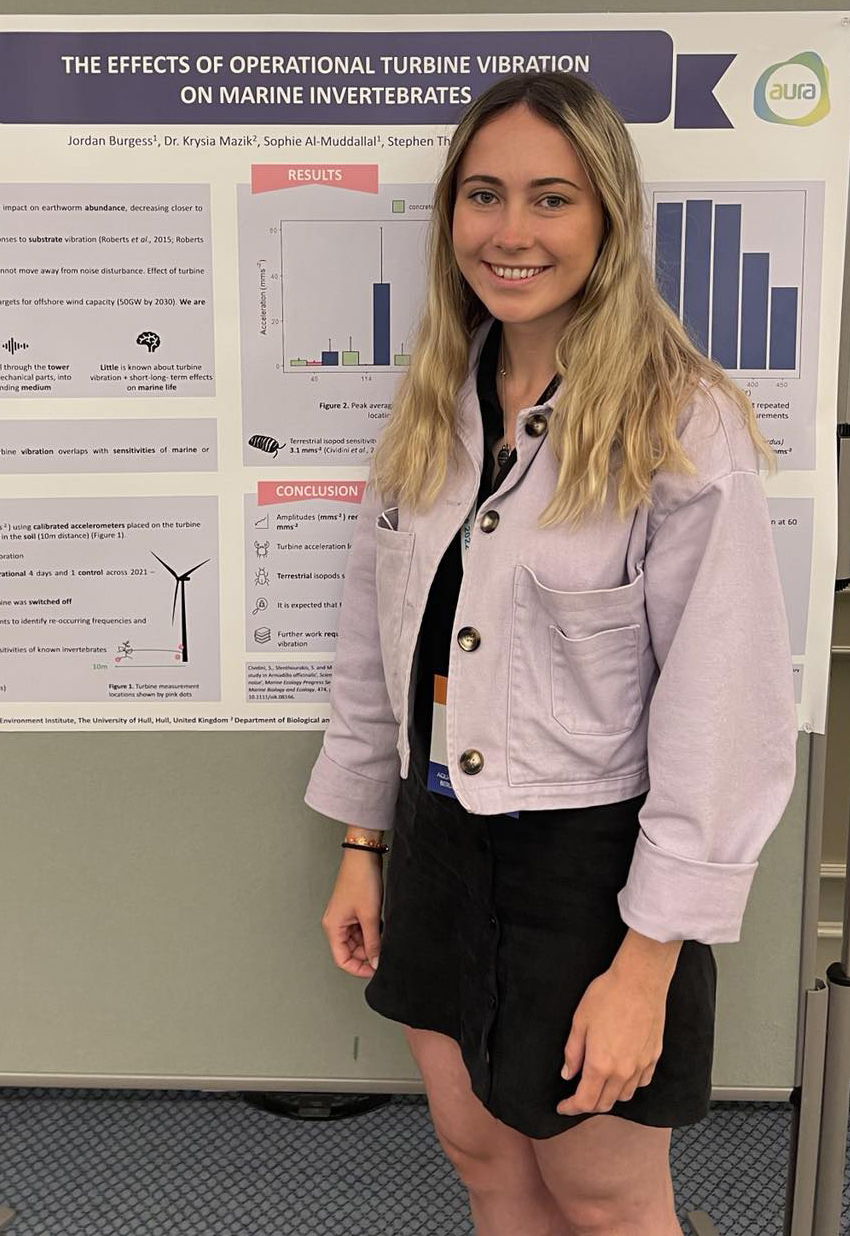



Jordan Burgess
Following successful completion of her PhD research, Jordan Burgess has secured a new role is as a PDRA on the ECOWind BOWIE project (Benthic Offshore Wind Interactions). She will be focussing on vibration impacts on a wider range of species. This work will be in collaboration with the University of Southampton and the University of Hull and builds on her PhD research with the Aura CDT.
Aura CDT Activities
I most recently acted as Cohort 1 Student Rep on the Aura CDT Student Committee. I have also previously acted as the Community Engagement Rep as I have always enjoyed making science fun and accessible for a wide range of audiences. While working at The Deep, part of my role involved talks and activities that were understood by both children and adults, therefore I have developed this skill. In my PGDip year with the Aura CDT I took part in an International Women’s Day in front of 100s of school children!
I was interviewed by Orsted to be part of a short documentary about how offshore wind has benefitted the energy estuary, focussing primarily on Grimsby in particular. This was particularly for inspiring the younger generation, with Orsted opening up a Youth Zone, enabling the next generation to get involved with offshore wind and for us to show them what’s possible.
I have also represented the Aura CDT at a RenewableUK parliamentary reception, as part of the University of Hull delegation. And recently I discussed my research with RenewableUK’s Head of Skills for Renewables, Scott Young, when he visited the University of Hull.
Background:
For my undergraduate degree, I studied BSc Marine Biology at the University of Hull, with a keen interest in anthropogenic impacts on various marine species. I have spent some time as a research assistant looking into noise and vibration on benthic marine species which sparked my interest in this field. I am now in my first year of the 4 Year Aura CDT programme looking into offshore wind energy.
Research Interests:
My interests are primarily focused upon anthropogenic impacts and species interactions; my undergraduate dissertation examined the relationship between fecundity and food availability at Dogger Bank of grey seals at the Donna Nook site. This research is pivotal at the minute given the North Sea Power Hub being developed within this feeding location. I am very interested in the impacts of noise and vibration as well as other anthropogenic impacts from offshore wind farm developments and the subsequent impacts, both short and long term.
Why you applied for the Aura CDT:
I applied for the Aura CDT programme because I wanted to challenge and develop my knowledge base within a field with increasing importance and demand. I felt that my passion for the subject and drive to examine knowledge gaps made me an ideal candidate for a PhD, as well as being very keen to pursue a career within research.
PhD Research:
The impacts of underwater noise and species in the marine environment have been well studied for marine mammals and some fish species. However, when looking at species further down the food-chain, research becomes sparser. There are tens of thousands of marine invertebrates which underpin the food web for the larger species that gain much protection from regulations. Bridlington is one of the largest ports for the European Lobster fishery in Europe, where landings made €4,200,000 in 2014. As more and more turbines are placed in the North Sea, noise is going to become a much bigger problem and have wider impacts on the more sessile species such as marine invertebrates. The impacts of noise may result in shorter term behavioural changes or longer-term physiological problems which will cause a greater economic problem in terms of lobster catches and their subsequent price per unit weight. My study will look at the effects, both short and long term, on commercially important invertebrates and the impacts that wind farm associated noise will have on these organisms. This may fall under two types of noise: impulsive through the installation and decommissioning and more continuous noise vibration during operation. More information on this PhD Research Project.
Published Research:
I published a paper looking at operational wind turbine vibration and how it may impact marine invertebrates in a journal focussing on the Effects of Noise on Aquatic Life.
Contact: j.burgess@2016.hull.ac.uk
Twitter: @jordan_burgess_

For an informal discussion, call +44 (0) 1482 463331
or contact auracdt@hull.ac.uk